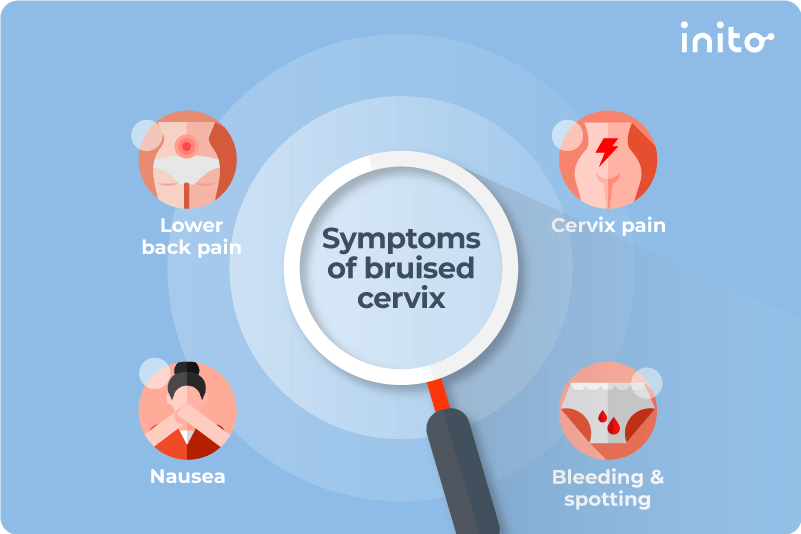Content table
Picture this: You’re in the middle of sex with your partner and -ouch!
Sudden pain during or after intercourse. If this sounds familiar, you may have bruised your cervix. It’s not common, but it does happen.
Some women may be more likely to get a cervical injury than others. This bruising resolves on its own, but it may be painful in the meantime.
Read on to know what it means to bruise your cervix, and what you can do about it.
Key Takeaways
- Bruising on the cervix is rare, but can be really painful. Don’t worry, the pain goes away on its own without treatment.
- Sexual intercourse or vaginal penetration is the most common cause of cervical bruising.
- If you think your cervix is bruised, take a break from sex.
- Lower abdominal pain can be caused by things other than cervix bruising, like STIs and UTIs.
- Visit your doctor if your pain is severe or doesn’t go away after two days.
What Are the Symptoms of Bruising Your Cervix?

Wondering what a bruised cervix feels like? Here are a few signs you might notice when you’ve got a bruised cervix:
Cervix pain
This is different from period pain or implantation pain and women usually describe it as a soreness or cramping in the lower belly. It may start during sex, right after the injury happens. This pain ranges in intensity depending on how severe the injury is.
One woman described this pain as “like someone was stabbing me with a red-hot fire poker, deep down in my gut, over and over again.”
Bleeding or spotting
Bleeding from your vagina may not seem like a big deal, since we expect it during our period. It’s also normal to have some bleeding after a gynecological exam, or bleeding from implantation. But vaginal bleeding at any other time isn’t normal. If you notice vaginal bleeding after sex, this may be a clue that you’ve bruised your cervix.

Lower back pain
Sometimes pain in your reproductive tract travels into your lower back. This may feel like an aching or soreness above your hip bones. So, if you feel discomfort or a deep ache in your back, know that the cervix injury might be severe.
Nausea
Some women say their cervical pain has been so bad that they’ve felt like they needed to throw up. You may feel nauseous or lightheaded if your cervix is severely injured.

Know your chances of Ovulation!
Take our ovulation quiz to understand how your hormone patterns and
lifestyle factors may affect your chances of ovulating
What Can Cause a Bruised Cervix?
The most common cause of cervix bruising is sex or penetration.
The average vaginal canal is only about two and a half inches deep. Repeated deep or rough penetration can create trauma at the opening of the cervix. So, if you’ve had rough or enthusiastic sex, this can lead to intense cervical pain afterwards.
Also, some women have shorter vaginal canals, making them more prone to cervical bruising.
Another cause of cervical bruising is the position of the cervix. The cervix moves according to your cycle. It’s lower in the weeks between your period and ovulation. This may mean you’re more likely to bruise your cervix during your fertile window.

Your cervix moves upwards and softens when you’re aroused. The vaginal canal also lubricates itself during arousal. If you’re not aroused before penetration, you are more likely to bruise your cervix
Women with more active sex lives may get bruising on the cervix more often as well. Certain positions create deeper vaginal penetration and may lead to bumping on the cervix.
You may be more likely to get bruises on your cervix if your partner has a large penis. If you use a dildo, which is often larger than the average penis, this can cause bruising on the cervix.
Even though all these factors can make you more likely to bruise your cervix, it’s still a very rare phenomenon. The bruising goes away on its own without treatment. So if your thing is rough sex or dildoes, don’t let fear of a bruised cervix hold you back.
Bruised Cervix and IUDs

Intrauterine Devices (IUDs) can cause symptoms that mimic a bruised cervix. This makes sense, because when an IUD is inserted it can irritate the cervical opening. It is normal to have cramping, soreness, or spotting after getting an IUD inserted. These symptoms should go away after one or two days.
If you get an IUD inserted and notice painful sex afterwards, this may be cause for concern. It may be a sign that your IUD has been displaced during intercourse. If pelvic pain sticks around after getting an IUD, check in with your OBGYN because this is not normal.
What to Do if You Feel Your Cervix Is Bruised?
Avoid intercourse and penetration for a few days. This will give your cervix time to rest and heal. Just like any other bruising, it should go away on its own.
If you’re in severe pain, some painkillers and anti-inflammatory drugs can help. Always consult your healthcare provider before you take any medicines as the dosage is based on your symptoms and body weight.
Can a Bruised Cervix Cause Infertility?
Nope. A bruised cervix is a temporary condition that goes away on its own. It won’t change your ability to conceive.
If you think you’ve bruised your cervix, you’ll probably want to avoid sex for a few days. But once the pain resolves, you can get right back to making love.
How Long Will It Take for My Bruised Cervix to Heal?

With proper care, a bruised cervix heals within a day or two. However, if the injury is severe, it might take one to two weeks to heal completely.
During this time, take a break from sex, rest, and avoid activities that increase abdominal pressure. This will ensure you don’t re-injure the cervix while it heals.
If you still notice pain after three or more days of abstinence, it may be time to see your OBGYN. They may do a pelvic exam just to investigate your pain.
How to Prevent a Bruised Cervix?
It’s pretty rare to bruise your cervix. However, here are a few tips to prevent it:
Being properly lubricated before sex is one way to avoid trauma to the cervix. Taking your time during foreplay or using fertility lubricants may be good strategies to avoid bruising your cervix.
If you’ve bruised your cervix more than once, pay attention to the behaviors that led to it happening. Maybe you weren’t aroused enough before sex, or maybe you used a different position than usual. Avoiding these factors can help you prevent a bruised cervix in the future.
What Are the Other Causes of Cervical Pain?
If it’s not a bruised cervix, other factors can lead to pain in your cervix or lower abdomen. Here are a few:
Cervicitis
Cervicitis, or inflammation of the cervix, has similar symptoms to those of cervical bruising. Infections can cause cervicitis that you get through sex (STIs). Untreated chlamydia, gonorrhea, genital herpes, and trichomoniasis can lead to cervical inflammation. If you have a history of STIs and are having lower abdominal pain, discharge, or painful intercourse, see your doctor.
Foreign bodies
Foreign substances can cause vaginal irritation and cervical inflammation. Spermicides, latex condoms, and feminine hygiene products can lead to allergic reactions on or around the cervix.
Vaginal infections
An overgrowth of vaginal flora, or bacteria, can irritate the cervix. This is called Bacterial Vaginosis (BV), and it can make you more susceptible to STIs.
Bacterial vaginosis is the most common vaginal condition for women between the ages of 15 and 44. It’s treated with prescription medications, so you’ll want to see a doctor if you think you have it.
Does a Bruised Cervix Feel Like a UTI?
The two can feel similar. Urinary Tract Infections (UTIs) are much more common than cervical bruising. UTIs are the most common at-home infection in the United States, whereas cervical bruising is very rare.
Let’s compare the common symptoms of a bruised cervix with a urinary tract infection.
Bruised Cervix Symptoms | Urinary Tract Infection Symptoms |
Pain during or immediately after sex, usually described as cramping. | Pain when you pee, usually described as burning. |
Soreness in the lower back | Pain and soreness in the lower back or flanks |
Tenderness in the lower belly | Can cause pressure or bloating in the lower abdomen. |
Bleeding or spotting after sex | Usually no bleeding or spotting. Chronic UTIs may lead to spotting |
Usually lasts for up to two days, goes away on its own | Usually lasts three days or more, requires antibiotics to treat it |
No fever | Can lead to fever |
Not a long-term medical problem | Can become a problem if untreated, leading to critical kidney infections. |
Cervix and Abdominal Pain: When to See a Doctor?
A bruised cervix is uncomfortable and painful, but it doesn’t threaten your health and heals on its own. Some symptoms can be clues that something else is going on. If you’re having any of these, it’s time to see a professional:
- Sudden, intense abdominal pain
- Cervical pain after getting an IUD put in
- Cervical pain that doesn’t go away after two days
- New vaginal discharge
- A sharp increase in vaginal bleeding
- Intense pain during sex
Was this article helpful?
- https://www.mayoclinic.org/symptoms/pelvic-pain/basics/when-to-see-doctor/sym-20050898
- https://academic.oup.com/humrep/article/21/6/1618/724374
- https://www.mindbodygreen.com/0-16961/a-28day-guide-to-your-reproductive-cycle.html
- https://onlinelibrary.wiley.com/doi/full/10.1002/jppr.1650#:~:text=Symptomatology%20of%20UTI&text=Typical%20symptoms%20of%20UTI%20include,of%20clinical%20syndrome%20of%20pyelonephritis.
- https://www.mayoclinic.org/diseases-conditions/cervicitis/symptoms-causes/syc-20370814#:~:text=Possible%20causes%20of%20cervicitis%20include,chlamydia%2C%20trichomoniasis%20and%20genital%20herpes.
- https://www.cdc.gov/std/bv/stdfact-bacterial-vaginosis.htm
- https://www.ncbi.nlm.nih.gov/pmc/articles/PMC6502976/#:~:text=Uncomplicated%20UTIs,UTIs%20are%20the&text=The%20prevalence%20in%20women%20over,11%25%20in%20the%20overall%20population.&text=Between%2050%25%20and%2060%25%20of,UTI%20in%20the%20previous%20year.











